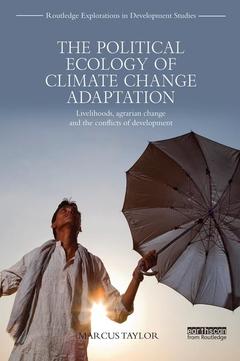The Political Ecology of Climate Change Adaptation Livelihoods, agrarian change and the conflicts of development Routledge Explorations in Development Studies Series

This book provides the first systematic critique of the concept of climate change adaptation within the field of international development. Drawing on a reworked political ecology framework, it argues that climate is not something ?out there? that we adapt to. Instead, it is part of the social and biophysical forces through which our lived environments are actively yet unevenly produced. From this original foundation, the book challenges us to rethink the concepts of climate change, vulnerability, resilience and adaptive capacity in transformed ways. With case studies drawn from Pakistan, India and Mongolia, it demonstrates concretely how climatic change emerges as a dynamic force in the ongoing transformation of contested rural landscapes. In crafting this synthesis, the book recalibrates the frameworks we use to envisage climatic change in the context of contemporary debates over development, livelihoods and poverty.
With its unique theoretical contribution and case study material, this book will appeal to researchers and students in environmental studies, sociology, geography, politics and development studies.
Preface: The Critique of Climate Change Adaptation 1. Climate Change and the Frontiers of Political Ecology 2. Socialising Climate 3. Making a World of Adaptation 4. Power, Inequality and Relational Vulnerability 5. Climate, Capital and Agrarian Transformations 6. Pakistan – Historicising Adaptation in the Indus Watershed 7. India – Water, Debt and Distress in the Deccan Plateau 8. Mongolia – Pastorialists, Resilience and Nomadic Capital 9. Conclusion: Adapting to a World of Adaptation
Marcus Taylor is an Associate Professor in the Department of Global Development Studies and School of Environmental Studies at Queen’s University, Canada.
Date de parution : 01-2017
15.6x23.4 cm
Date de parution : 11-2014
15.6x23.4 cm
Thèmes de The Political Ecology of Climate Change Adaptation :
Mots-clés :
Water Falls; Climate Change Adaptation; Biodiversity; Groundwater Depletion; Climate Change; Ulaan Baatar; Conservation; Socioecological Relations; Environmental economics; Tamil Nadu; Environmental policy; Social Reproduction; Environmental studies; Tavan Tolgoi; India; Socio-ecological Relations; Mongolia; Meteorological Forces; Nepal; Anthropocentric Climate Change; Pakistan; Andhra Pradesh; Sustainability; Haroon Akram Lodhi; Sustainable development; Human Security; agrarian; Agrarian Pakistan; agriculture; Metabolic Rift; global south; Indus Watershed; political ecology; Agrarian Modernisation; Human Security Paradigm; Agrarian Social Relations; Socio-ecological Production; Deccan Plateau; National Climate Change Policy; Mongolian Pastoralism; Agrarian Question



